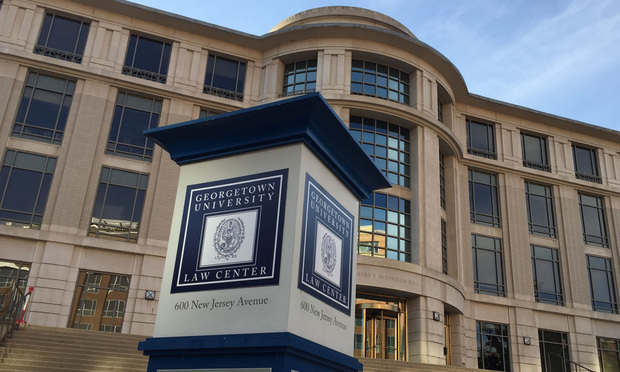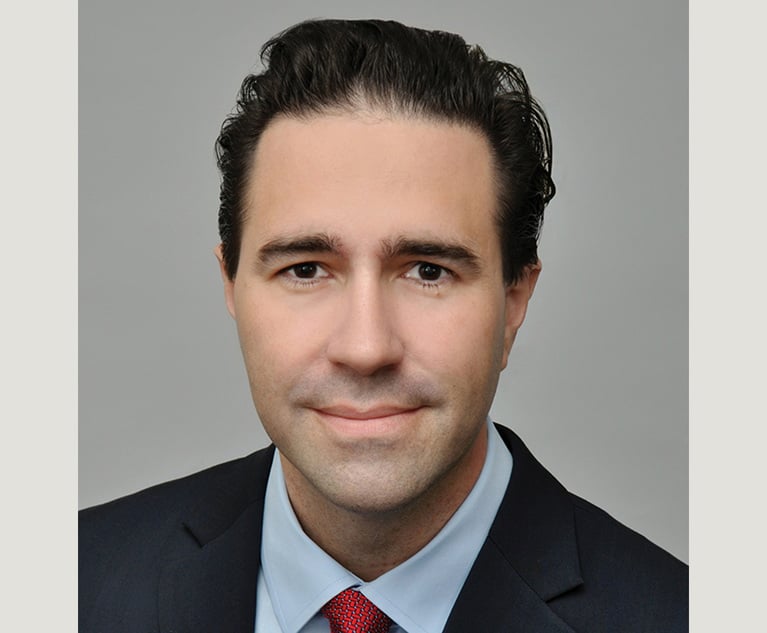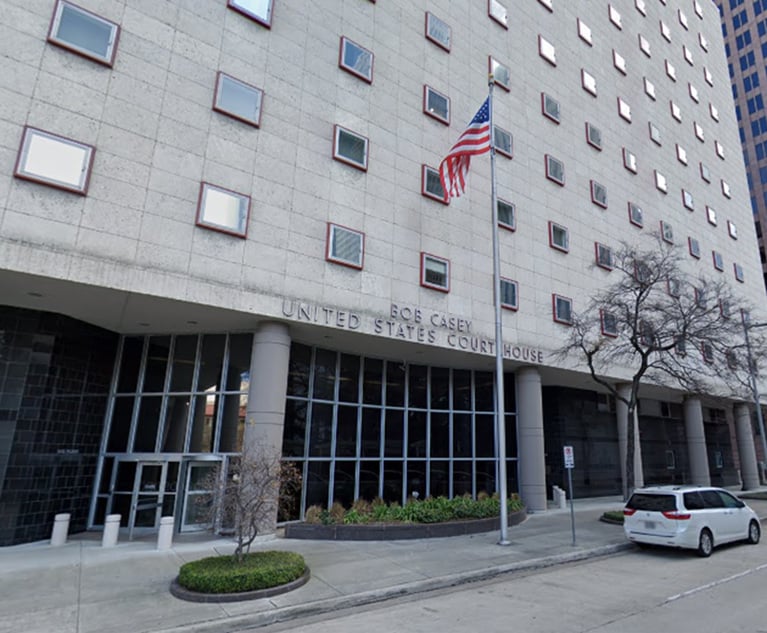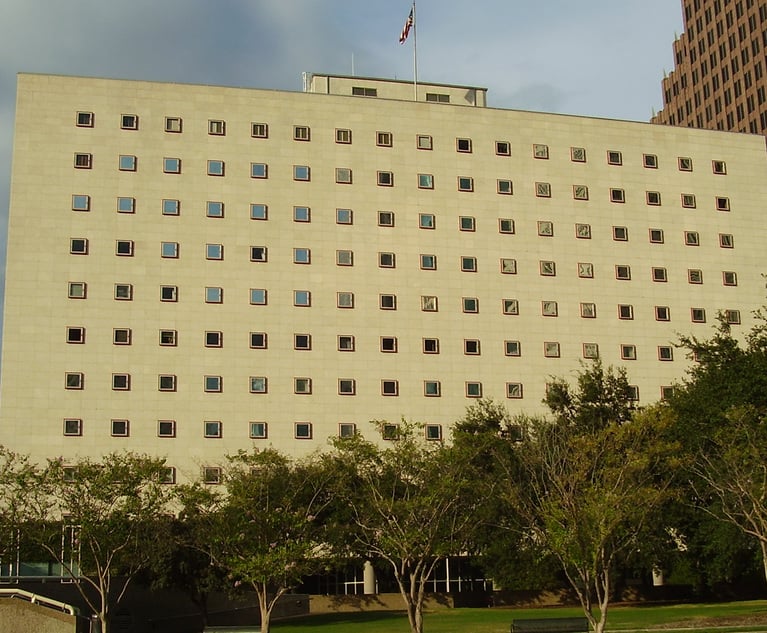Texas Tax Lawyer's Suit Over Georgetown Job Fair Ban Is Tossed
John Anthony Castro alleged that Georgetown University Law Center discriminated and retaliated against him when it barred him from a 2015 recruiting event for tax LL.M students. He was excluded from the same event as a student for allegedly lying about attending West Point.
August 16, 2018 at 11:59 AM
3 minute read
 Georgetown University Law Center/Photo: Diego M. Radzinschi/NLJ
Georgetown University Law Center/Photo: Diego M. Radzinschi/NLJ
A federal judge has thrown out a Texas tax attorney's lawsuit against his alma mater, Georgetown University Law Center, that claimed the school unlawfully banned him from a job fair after concerns arose over discrepancies on his resume.
Judge Barbara Lynn of the U.S. District Court for the Northern District of Texas dismissed John Anthony Castro's suit Tuesday on the grounds that the court lacked personal jurisdiction over the law school in Washington, D.C. “Defendants' only alleged contact with Texas is that Castro, a Texas resident, placed a phone call, on an unidentified date, to Georgetown University's Career Services Office,” Lynn wrote in her opinion. “This single contact is not evidence that Defendants purposefully directed any activities to Texas.”
Castro, who is Hispanic, sued the law school in March claiming that Georgetown's decision to bar him from its tax hiring fair constituted racial discrimination and retaliation.
Castro's attorney, Joshua Milam, did not immediately respond to request for comment Thursday. A Georgetown Law spokeswoman reached Thursday declined to comment.
Castro's dispute with the school dates back to his days as a student in Georgetown's tax LL.M. program during the 2012-13 academic year, according to his complaint. (Castro obtained his J.D. from the University of New Mexico School of Law.) Prior to Georgetown's spring hiring fair for tax LL.M. students, administrators raised concerns about discrepancies in Castro's resume and barred him from attending the fair as a student.
“Undeterred by the University's decision, Castro reached out directly to employers who would be attending and sought to arrange interviews with them at the job fair,” according to the school's April 17 motion to dismiss. “When the University found out, it also became aware of another misrepresentation Castro had made: he claimed to have been a cadet at the U.S. Military Academy at West Point, when in fact he had only briefly attended a prep school for students not yet academically qualified to attend West Point.”
In his complaint, Castro claims that he, in fact, was accepted to West Point and attended the prepatory program. He had not intended to mislead anyone, he said, about his record of military service. He alleged that associate dean Nan Hunter sought to have him expelled but that an independent review concluded he should not be kicked out of the program.
The law school's motion said that the matter was referred to the university's ethics counsel, which concluded that Castro should not be disciplined.
Two years after leaving Georgetown, Castro sought to attend the same spring hiring event for tax LL.M. students from which he had been earlier barred, now in the role of employer seeking talent for his firm, Castro & Co. But Hunter excluded him from the event, according to both Castro's complaint and the school's motion to dismiss.
“Castro is a clearly Hispanic individual and Defendant's concerted actions continually targeting Castro are in clear violation of Castro's Constitutional rights, and Castro is being denied equal protection because of his race through Defendant's conspiratorial actions,” reads his complaint.
The school's motion to dismiss argued that its 2015 denial of Castro's participation in the hiring fair falls outside of the statute of limitations and that the Texas court has no jurisdiction over the Washington-based matter.
Lynn focused her opinion on the later argument, ultimately dismissing the case.
This content has been archived. It is available through our partners, LexisNexis® and Bloomberg Law.
To view this content, please continue to their sites.
Not a Lexis Subscriber?
Subscribe Now
Not a Bloomberg Law Subscriber?
Subscribe Now
NOT FOR REPRINT
© 2025 ALM Global, LLC, All Rights Reserved. Request academic re-use from www.copyright.com. All other uses, submit a request to [email protected]. For more information visit Asset & Logo Licensing.
You Might Like
View All
Houston Law Firm Files $250K Breach of Contract Suit Against 2 Former Lawyers
3 minute read

Texas Bankruptcy Judge Withdraws Ethics Complaint Against Jackson Walker
2 minute read
Conspiracy Suits Against Quinn Emanuel, Roc Nation Moved to Federal District Court
Trending Stories
- 1Over 700 Residents Near 2023 Derailment Sue Norfolk for More Damages
- 2Decision of the Day: Judge Sanctions Attorney for 'Frivolously' Claiming All Nine Personal Injury Categories in Motor Vehicle Case
- 3Second Judge Blocks Trump Federal Funding Freeze
- 4Crypto Hacker’s $65 Million Scam Ends in Indictment
- 5Trump's Inspectors General Purge Could Make Policy Changes Easier, Observers Say
Who Got The Work
J. Brugh Lower of Gibbons has entered an appearance for industrial equipment supplier Devco Corporation in a pending trademark infringement lawsuit. The suit, accusing the defendant of selling knock-off Graco products, was filed Dec. 18 in New Jersey District Court by Rivkin Radler on behalf of Graco Inc. and Graco Minnesota. The case, assigned to U.S. District Judge Zahid N. Quraishi, is 3:24-cv-11294, Graco Inc. et al v. Devco Corporation.
Who Got The Work
Rebecca Maller-Stein and Kent A. Yalowitz of Arnold & Porter Kaye Scholer have entered their appearances for Hanaco Venture Capital and its executives, Lior Prosor and David Frankel, in a pending securities lawsuit. The action, filed on Dec. 24 in New York Southern District Court by Zell, Aron & Co. on behalf of Goldeneye Advisors, accuses the defendants of negligently and fraudulently managing the plaintiff's $1 million investment. The case, assigned to U.S. District Judge Vernon S. Broderick, is 1:24-cv-09918, Goldeneye Advisors, LLC v. Hanaco Venture Capital, Ltd. et al.
Who Got The Work
Attorneys from A&O Shearman has stepped in as defense counsel for Toronto-Dominion Bank and other defendants in a pending securities class action. The suit, filed Dec. 11 in New York Southern District Court by Bleichmar Fonti & Auld, accuses the defendants of concealing the bank's 'pervasive' deficiencies in regards to its compliance with the Bank Secrecy Act and the quality of its anti-money laundering controls. The case, assigned to U.S. District Judge Arun Subramanian, is 1:24-cv-09445, Gonzalez v. The Toronto-Dominion Bank et al.
Who Got The Work
Crown Castle International, a Pennsylvania company providing shared communications infrastructure, has turned to Luke D. Wolf of Gordon Rees Scully Mansukhani to fend off a pending breach-of-contract lawsuit. The court action, filed Nov. 25 in Michigan Eastern District Court by Hooper Hathaway PC on behalf of The Town Residences LLC, accuses Crown Castle of failing to transfer approximately $30,000 in utility payments from T-Mobile in breach of a roof-top lease and assignment agreement. The case, assigned to U.S. District Judge Susan K. Declercq, is 2:24-cv-13131, The Town Residences LLC v. T-Mobile US, Inc. et al.
Who Got The Work
Wilfred P. Coronato and Daniel M. Schwartz of McCarter & English have stepped in as defense counsel to Electrolux Home Products Inc. in a pending product liability lawsuit. The court action, filed Nov. 26 in New York Eastern District Court by Poulos Lopiccolo PC and Nagel Rice LLP on behalf of David Stern, alleges that the defendant's refrigerators’ drawers and shelving repeatedly break and fall apart within months after purchase. The case, assigned to U.S. District Judge Joan M. Azrack, is 2:24-cv-08204, Stern v. Electrolux Home Products, Inc.
Featured Firms
Law Offices of Gary Martin Hays & Associates, P.C.
(470) 294-1674
Law Offices of Mark E. Salomone
(857) 444-6468
Smith & Hassler
(713) 739-1250






